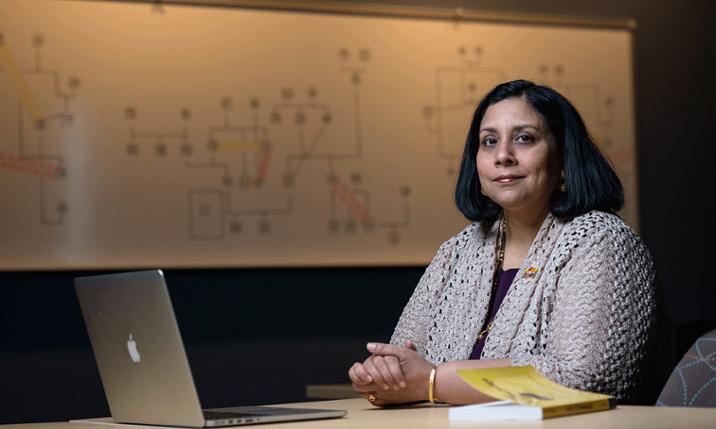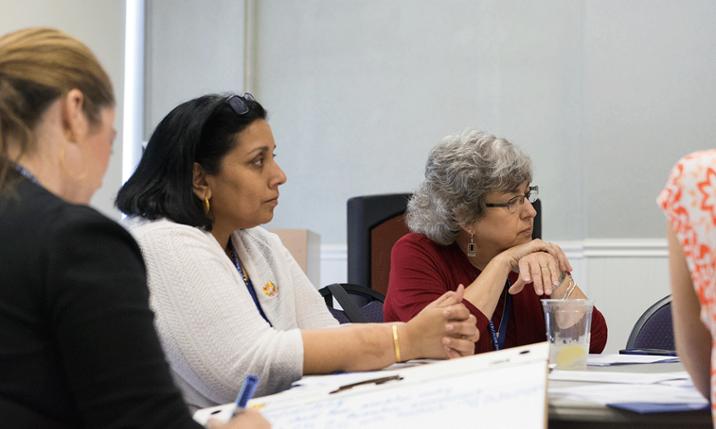Finding the funds of knowledge
Education
A universal lesson in diversity
By Martha Bell Graham
There’s little difference between sizing up a person or a community, a roommate or a third-grader. It’s easy to do — but our conclusions are often wrong. One education professor believes there’s a key to avoid mistaken judgments — and for education majors at JMU, it’s a critical lesson.
“The crime rates in Harlem are quite high,” Smita Mathur told her gathered students.
“Have you ever been there at night?” asked one of her African-American students.
“Oh no,” Mathur replied. “I never would go there at night, and I, in fact, make sure that my car windows are rolled up and it’s locked.” “Walk with me,” her student challenged her.
And Mathur did.
''Tapping into the talents, the expertise, and the generational themes that every family owns...resonates with students.'
“I was scared, but I went walking with him [in Harlem], and he knew everybody, and he was yelling out to people, saying ‘Meet my professor’ and people would say, ‘Hey professor.’ It was such a friendly context, and then I started to question. I was scared of this context, but this is home to my student, and it’s the friendliest possible thing from his lenses. And it helped me change mine, too.”
While walking in Harlem, Mathur, professor of early, elementary, and reading education, was practicing a truth she teaches students in her classes. In addition to child development and a course on home and school relations, Mathur leads a course for master’s level teachers, in which she introduces students to the concept of “Funds of Knowledge.”
Pioneered by California educators, “Funds of Knowledge” is the practice of tapping into the talents, the expertise, and the generational themes that every family owns. It is digging deeper, finding a real connection. “It’s anything that the parents [or students] are experts in,” Mathur says.
Mathur uses an example from the Native American population: “It could be preserving foods. It’s like a chemistry experiment … learning chemical reactions, preserving food, nutrition. There’s so much of this information that mothers had in the Native American communities that they could bring to class. All of that was infused … such a rich meaningful experience as opposed to a teacher from the outside doing isolated lesson plans that didn’t resonate with the students because it didn’t connect to their lives.”
Mathur, herself, is a study in diversity. “I call myself a Southern, Indian, Irish girl, she says, laughing.” Mathur was born in Alabama, to Indian parents, with Irish godparents, and schooled in India, Scotland and Nigeria. So moving to Harrisonburg — a city she perceived as homogenous — to teach in JMU’s College of Education was a leap of faith.
“I was living in Florida, [in a] very homogeneous community. One of the reasons we wanted to move … was that we felt isolated. We didn’t want to jump into another place that would make us feel isolated, so we were reluctant. We met with Dean Wishon, and I expressed my concerns. He and Dr. Margaret Shaeffer and Dr. Maggie Kyger sat with me and my husband, and they talked a lot about the community and offered different suggestions. They engaged with me, looked for options and validated how we were feeling. It was so refreshing. And I said with leadership like this I can’t go wrong. So we came here, and every week I either meet a person or see something or I discover a shop or the international festival. So I feel like [Harrisonburg] is such a hidden secret in diversity. It is more diverse than it lets on.”
Finding an individual student’s Funds of Knowledge — like discovering what a community is really like — is the lesson Mathur helps her students embrace.
''By learning about themselves, teachers understand how to create a better learning environment for their own students.'
Mathur cites a student she met in Florida, an immigrant from Colombia who spoke little English. She secured employment as a children’s caregiver. “One day,” Mathur says, “someone was teaching her how to do a diaper, and she felt so angry and minimized. She said ‘I’m not even trusted to change diapers.’” In her former country, Mathur learned, she had been a highly skilled emergency room nurse — and yet she was changing diapers. Once they tapped into her Funds of Knowledge, Mathur says, “The transformation was amazing.” It elevated her self-worth — an element critical to effective learning. The student went on to write a book for women in her native language about heart health.

Before teachers in training can fully embrace their students’ Funds of Knowledge, however, they must embrace their own, Mathur says. “The message doesn’t really resonate with them. There’s a certain amount of readiness that’s important … to tap into Funds of Knowledge. What I try to do in my class is to help them get ready to embrace this, so a lot of our semester is self-reflection and self-development — to reach readiness and courage. It takes courage.”
Mathur helps her students by having them create a personal genogram, which is a pictorial study of their family history. “They look into three generations of their own families, and they look at the common themes … and see how their family has made them who they are, and who they are as teachers.” It is a process of self-discovery, self-realization.
By learning about themselves, teachers understand how to create a better learning environment for their own students. This ability to look beyond the obvious or the stereotypical and to discover the Funds of Knowledge is what Mathur hopes to teach her students because, she says, “It’s critical to being a good teacher.”
